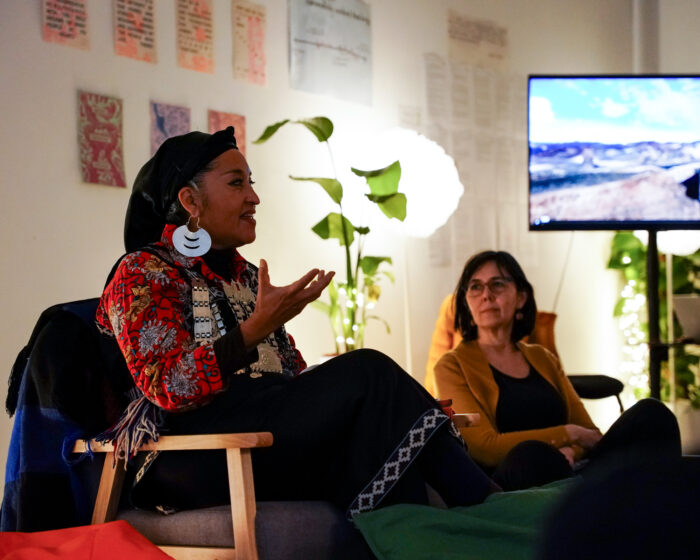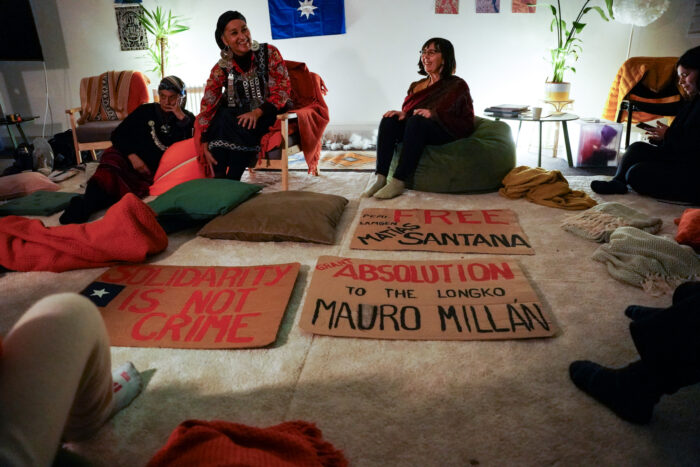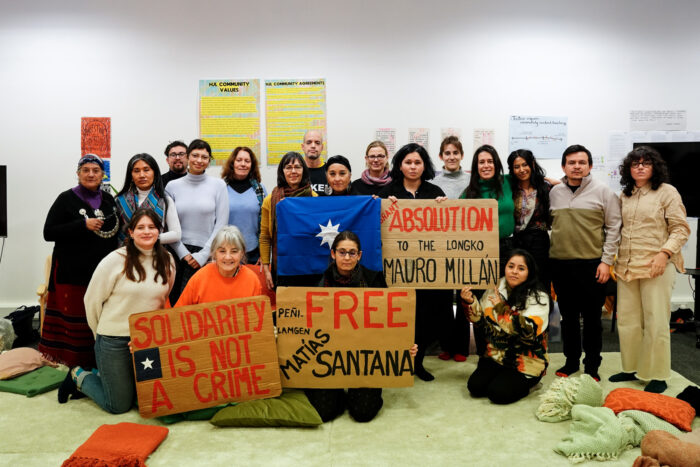On a cold Sunday afternoon in February, around 20 activists, journalists, researchers, and community representatives in London gathered in a circle to listen to Mapuche weychafe (warrior) Moira Millán and Tehuelche elder Ñaña Vilma. Moira and Vilma had travelled from southern Patagonia to Europe to spread awareness of the urgent situation for Indigenous peoples in the south of Argentina, and to strengthen bonds of international solidarity.
The Mapuche and Tehuelche people are Indigenous to the southern cone, including parts of Chilean and Argentinian Patagonia. Moira lives in the province of Chubut, a territory marked by land conflicts due to the advance of extractivism in the form of fossil fuel extraction, deforestation, and mining, as well as real estate development. The Argentine Constitution recognises the pre-existence of Indigenous peoples and their right to communitarian ownership and possession of ancestral lands, however, in practice such rights are consistently violated under pressures from political and economic powers.
In the absence of state action on their claims for recognition, Mapuche communities have organised to reclaim and protect ancestral territory. But the response to their direct action has been marked by police brutality, racism, and media campaigns delegitimising their struggle. Indeed, Mapuche land defenders have been framed as terrorists in an attempt to build an internal enemy, and have been accused of acts of vandalism and destruction, including the burning down of native forests, without any proof.
What is surprising about such accusations is that they directly contradict what Mapuche land defenders advocate for: their struggle is for their right to live according to their culture and cosmology but it is also about preserving the land and the wild ecosystems they live within. As Moira shared during the gathering in London, ‘There is no human leader or wisdom. It is only in the land. The land has to guide us towards transformation.’ She described the Mapuche as a telluric people, with telluric meaning that ‘the spiritual, cultural, social, and political are constituted and defined from the land.’
The persecution of the Mapuche people and the forms of violence they have been facing is unfortunately not new. Previous governments have championed the advance of the extractive frontier and failed to act meaningfully on the matter of recognising ancestral lands. However, the new political landscape under the government of ultra right-wing president Javier Milei sounds the alarm on many issues.

In the first place, this is a government that has claimed social justice is an aberration, and they have questioned the role of human rights in Argentine democracy. Second, the government’s Minister of Security is set on pushing anti-protest measures and legislation that will criminalise the right to protest, making any protests by Mapuche communities more vulnerable to lawfare, using the legal system to repress actions.
Furthermore, Milei’s call to expand resource extraction, as spelled out in his recent call for a national pact with the provinces, reiterates that the country’s resources are up for grabs, and incentivises provincial governors to further push the extraction of nature for export at all cost.
This planned deepening of the extractivist model will only exacerbate conflicts around ancestral land, as local and national governments and transnational companies push to expand the extractive frontier into new territories.
Finally, the current political climate is conducive to the emboldening of anti-Indigenous positions. In the last days of March this year, a high-profile congressman presented a project for repealing the law that has been used as a framework for stopping expulsions of Indigenous communities from their lands over the last two decades. This would leave communities even more vulnerable to eviction than they are today.
The situation is already alarming. In March this year, five members of the Lof Buenuleo (the Buenuleo community) were found guilty of trespassing on land they claim as ancestral in the province of Río Negro. Longko (chief) Mauro Millán, Moira’s brother, was also accused and then absolved of trespassing charges for entering that same territory in 2019 for the purpose of conducting a ceremony. In his words, as reported on Infoterritorial, ‘what becomes evident is that there is a de facto power, a power that brings together real estate projects, business powers, foreign, and local landowners, who are part of an elite that is clearly very small, but very powerful. What they are trying to do is to exercise control over the decisions of the Mapuche people in recent times of returning to the territory, because we are challenging not only their real estate projects, but also their intentions of doing business with the extractive companies’ [author’s translation from Spanish].

Currently, as Moira and Vilma shared at the event, communities are also fighting for the freedom of Matías Santana, a key witness in the case of disappearance followed by death of ally activist Santiago Maldonado in 2017. Santana’s lawyers claim that he has been detained without proof in relation to cases of arson and supposed land occupation. The fact that this happened just days before an important court appearance on the Maldonado case has given cause for members of the community to believe he was imprisoned because of his role as a key witness.
In the face of these events, in her London visit weychafe Moira Millán stood defiant. She called out the political and economic culprits of terricide, which she describes as the intertwined violence against land, bodies, and ways of living experienced by Indigenous peoples. She also shared powerful and inspiring stories of Indigenous women coming together to demand their rights are upheld. Through her accounts, she invited us to challenge the global system that has allowed the destruction of nature in the name of progress, and the normalisation of oppression and violence against Indigenous peoples that has been instrumental to these aims.
As territorial conflicts and persecution of land defenders deepen, it will be paramount for international activists and human rights and environmental organisations to watch closely, and to show their solidarity for these struggles.

LAB is in the early stages of publishing Millán’s testimony book, Terricide, in English. Please consider supporting the project by donating to LAB here.
Paula Serafini is a lecturer in Creative and Cultural Industries at Queen Mary University of London interested in extractivism, social movements, art activism, performance, cultural labour, and socioecological transitions. Over the last decade and a half she has organised alongside autonomous collectives in London, where she is currently based. She is the author of Performance Action: The Politics of Art Activism (Routledge, 2018) and Creating Worlds Otherwise: Art, Collective Action, and (Post)Extractivism (Vanderbilt University Press, 2022), and co-editor of artWORK: Art, Labour and Activism (Rowman and Littlefield International, 2017) and Arte y Ecología Política (IIGG-CLACSO, 2020).

